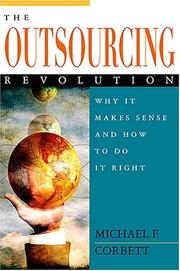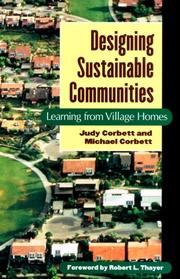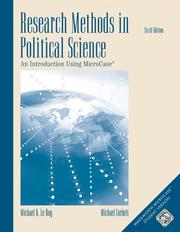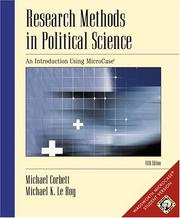| Listing 1 - 10 of 14 | << page >> |
Sort by
|
Book
ISBN: 9789811305115 9811305110 9811305102 Year: 2018 Publisher: Singapore : Springer Singapore : Imprint: Springer,
Abstract | Keywords | Export | Availability | Bookmark
 Loading...
Loading...Choose an application
- Reference Manager
- EndNote
- RefWorks (Direct export to RefWorks)
The book is a collective investigation of the structuring of theses in education, the social sciences and other disciplines that commonly do not follow the standard procedures of the scientific method. To help research students design a structure for their own thesis and liberate their investigations from the constraints associated with the use of the conventional structure, it explains how the structures adopted were designed to suit the topic, methodology and paradigm. It also provides a wide range of examples to draw upon, which suit a broad spectrum of theory, methodological approaches, research methods and paradigms. Additionally, by analyzing the methodologies and paradigms, and reviewing the methodological and paradigmatic spectrum, it offers a significant contribution to the way research is conceptualized. The book addresses a number of key questions faced by students, supervisors and examiners: •Why do examiners often find it difficult to read work in non-scientific disciplines when theses are structured in accordance with the conventional scientific method? •Why do students in non-scientific disciplines struggle to write up the outcomes of their research in the conventional structure? •What alternative thesis structures can be devised to better suit the wide range of methods? •Which theories and paradigms are commonly followed in education and the social sciences and how do these perspectives influence the research process? •What methods, theories and paradigms are commonly adopted by education and social science students and what problems do these pose when students write their theses?
Science --- Social sciences (general) --- Sociology --- Didactics --- Higher education --- HO (hoger onderwijs) --- sociologie --- didactiek --- onderzoeksmethoden --- sociale wetenschappen --- methodologieën --- Higher education. --- Learning. --- Instruction. --- Social sciences. --- Sociology—Research. --- Higher Education. --- Learning & Instruction. --- Methodology of the Social Sciences. --- Research Methodology. --- Behavioral sciences --- Human sciences --- Sciences, Social --- Social science --- Social studies --- Civilization --- Learning process --- Comprehension --- Education --- College students --- Postsecondary education --- Universities and colleges --- Education, Higher.
Book
ISBN: 9811525609 9811525595 Year: 2020 Publisher: Singapore : Springer Singapore : Imprint: Springer,
Abstract | Keywords | Export | Availability | Bookmark
 Loading...
Loading...Choose an application
- Reference Manager
- EndNote
- RefWorks (Direct export to RefWorks)
This book examines challenges associated with the education of teachers in and for rural places. It offers a new perspective with respect to how Canadian educators are shifting the conversation toward a hopeful discourse concerning how educators can foster meaningful rural learning environments, which will contribute to building stronger rural communities and regions. A central focus of the book is emerging reconceptualization of education, place and indigeneity in Canadian education in the wake of the Truth and Reconciliation Commission Though the challenge of addressing rural teaching and learning lies partly in the nuances and complexities of unique places, there are also common threads that affect virtually all communities in rural, regional and remote educational, cultural, economic, and social geographies. Chapters in this collection provide current research in Canadian rural education including examples and stories from the field – contributed by teachers, administrators, and superintendents – on the challenges and creative opportunities that they have discovered in their own rural context, giving hope and inspiration for what is possible. The book will appeal to all readers interested in rural education and teacher education, as well as to those concerned with educational inequality and indigenous education.
Teachers --- Training of --- Faculty (Education) --- Instructors --- School teachers --- Schoolteachers --- School employees --- Teaching. --- Educational sociology. --- Learning. --- Instruction. --- Professional education. --- Vocational education. --- Teaching and Teacher Education. --- Sociology of Education. --- Learning & Instruction. --- Professional & Vocational Education. --- Education, Vocational --- Vocational training --- Work experience --- Education --- Technical education --- Education, Professional --- Career education --- Education, Higher --- Learning process --- Comprehension --- Education and sociology --- Social problems in education --- Society and education --- Sociology, Educational --- Sociology --- Didactics --- Instruction --- Pedagogy --- School teaching --- Schoolteaching --- Instructional systems --- Pedagogical content knowledge --- Training --- Aims and objectives
Digital
ISBN: 9789811305115 Year: 2018 Publisher: Singapore Springer Singapore, Imprint: Springer
Abstract | Keywords | Export | Availability | Bookmark
 Loading...
Loading...Choose an application
- Reference Manager
- EndNote
- RefWorks (Direct export to RefWorks)
The book is a collective investigation of the structuring of theses in education, the social sciences and other disciplines that commonly do not follow the standard procedures of the scientific method. To help research students design a structure for their own thesis and liberate their investigations from the constraints associated with the use of the conventional structure, it explains how the structures adopted were designed to suit the topic, methodology and paradigm. It also provides a wide range of examples to draw upon, which suit a broad spectrum of theory, methodological approaches, research methods and paradigms. Additionally, by analyzing the methodologies and paradigms, and reviewing the methodological and paradigmatic spectrum, it offers a significant contribution to the way research is conceptualized. The book addresses a number of key questions faced by students, supervisors and examiners: •Why do examiners often find it difficult to read work in non-scientific disciplines when theses are structured in accordance with the conventional scientific method? •Why do students in non-scientific disciplines struggle to write up the outcomes of their research in the conventional structure? •What alternative thesis structures can be devised to better suit the wide range of methods? •Which theories and paradigms are commonly followed in education and the social sciences and how do these perspectives influence the research process? •What methods, theories and paradigms are commonly adopted by education and social science students and what problems do these pose when students write their theses?
Science --- Social sciences (general) --- Sociology --- Didactics --- Higher education --- HO (hoger onderwijs) --- sociologie --- didactiek --- onderzoeksmethoden --- sociale wetenschappen --- methodologieën
Multi
ISBN: 9789811525605 Year: 2020 Publisher: Singapore Springer Singapore, Imprint: Springer
Abstract | Keywords | Export | Availability | Bookmark
 Loading...
Loading...Choose an application
- Reference Manager
- EndNote
- RefWorks (Direct export to RefWorks)
This book examines challenges associated with the education of teachers in and for rural places. It offers a new perspective with respect to how Canadian educators are shifting the conversation toward a hopeful discourse concerning how educators can foster meaningful rural learning environments, which will contribute to building stronger rural communities and regions. A central focus of the book is emerging reconceptualization of education, place and indigeneity in Canadian education in the wake of the Truth and Reconciliation Commission Though the challenge of addressing rural teaching and learning lies partly in the nuances and complexities of unique places, there are also common threads that affect virtually all communities in rural, regional and remote educational, cultural, economic, and social geographies. Chapters in this collection provide current research in Canadian rural education including examples and stories from the field – contributed by teachers, administrators, and superintendents – on the challenges and creative opportunities that they have discovered in their own rural context, giving hope and inspiration for what is possible. The book will appeal to all readers interested in rural education and teacher education, as well as to those concerned with educational inequality and indigenous education.
Sociology of education --- Didactics --- Teaching --- Technical, artistic and vocational education --- Higher education --- Personnel management --- aansluiting onderwijs-arbeidsmarkt --- bedrijfsopleidingen --- didactiek --- onderwijs --- beroepsopleiding --- HRM (human resource management) --- professionaliteit --- leren --- levenslang leren --- hoger beroepsonderwijs --- lesgeven

ISBN: 0793192145 Year: 2004 Publisher: Chicago (Ill.) Dearborn trade publishing
Abstract | Keywords | Export | Availability | Bookmark
 Loading...
Loading...Choose an application
- Reference Manager
- EndNote
- RefWorks (Direct export to RefWorks)
Contract system (Labor) --- Contracting out --- Reengineering (Management) --- Management

ISBN: 0815331436 081533141X Year: 1999 Volume: 1197 Publisher: New York London Garland Publishing
Abstract | Keywords | Export | Availability | Bookmark
 Loading...
Loading...Choose an application
- Reference Manager
- EndNote
- RefWorks (Direct export to RefWorks)
322 <73> --- Religion and politics --- -Political science --- Politics, Practical --- Politics and religion --- Religion --- Religions --- Political science --- Godsdienstige tolerantie. Godsdienstpolitiek--Verenigde Staten van Amerika. VSA. USA --- Religious aspects --- Political aspects --- -Godsdienstige tolerantie. Godsdienstpolitiek--Verenigde Staten van Amerika. VSA. USA --- 322 <73> Godsdienstige tolerantie. Godsdienstpolitiek--Verenigde Staten van Amerika. VSA. USA --- United States

ISBN: 1610912616 9781610912617 1559636866 9781559636865 Year: 2000 Publisher: Washington, D.C. Island Press
Abstract | Keywords | Export | Availability | Bookmark
 Loading...
Loading...Choose an application
- Reference Manager
- EndNote
- RefWorks (Direct export to RefWorks)
The movement toward creating more sustainable communities has been growing for decades, and in recent years has gained new prominence with the increasing visibility of planning approaches such as the New Urbanism. Yet there are few examples of successful and time-tested sustainable communities.Village Homes outside of Davis, California offers one such example. Built between 1975 and 1981 on 60 acres of land, it offers unique features including extensive common areas and green space; community gardens, orchards, and vineyards; narrow streets; pedestrian and bike paths; solar homes; and an innovative ecological drainage system. Authors Judy and Michael Corbett were intimately involved with the design, development, and building of Village Homes, and have resided there since 1977.In Designing Sustainable Communities, they examine the history of the sustainable community movement and discuss how Village Homes fits into the context of that movement. They offer an inside look at the development of the project from start to finish, describing how the project came about, obstacles that needed to be overcome, design approaches they took, problems that were encountered and how those problems were solved, and changes that have occurred over the years. In addition, they compare Village Homes with other communities and developments across the country, and discuss the future prospects for the continued growth of the sustainable communities movement.The book offers detailed information on a holistic approach to designing and building successful communities. It represents an invaluable guide for professionals and students involved with planning, architecture, development, and landscape architecture, and for anyone interested increating more sustainable communities.
Sustainable Development --- City Planning --- Business & Economics --- Political Science
Book
ISBN: 9789811525605 Year: 2020 Publisher: Singapore Springer Singapore :Imprint: Springer
Abstract | Keywords | Export | Availability | Bookmark
 Loading...
Loading...Choose an application
- Reference Manager
- EndNote
- RefWorks (Direct export to RefWorks)
Sociology of education --- Didactics --- Teaching --- Technical, artistic and vocational education --- Higher education --- Personnel management --- aansluiting onderwijs-arbeidsmarkt --- bedrijfsopleidingen --- didactiek --- onderwijs --- beroepsopleiding --- HRM (human resource management) --- professionaliteit --- leren --- levenslang leren --- hoger beroepsonderwijs --- lesgeven

ISBN: 9780534602352 0534602355 Year: 2006 Publisher: Belmont (CA): Thomson Higher Education,
Abstract | Keywords | Export | Availability | Bookmark
 Loading...
Loading...Choose an application
- Reference Manager
- EndNote
- RefWorks (Direct export to RefWorks)

ISBN: 9780534573614 0534573614 Year: 2003 Publisher: London: Thomson/Wadsworth,
Abstract | Keywords | Export | Availability | Bookmark
 Loading...
Loading...Choose an application
- Reference Manager
- EndNote
- RefWorks (Direct export to RefWorks)
| Listing 1 - 10 of 14 | << page >> |
Sort by
|

 Search
Search Feedback
Feedback About UniCat
About UniCat  Help
Help News
News